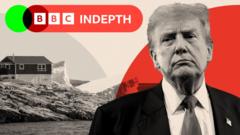Denmark's Prime Minister Mette Frederiksen and key officials are navigating a delicate diplomatic challenge posed by Donald Trump's provocative statements about acquiring Greenland. The government aims to maintain a conciliatory stance, emphasizing Greenland's autonomy and its people's right to self-determination, while also managing the potential economic repercussions of escalating tensions with the US.
Denmark Navigates Diplomatic Waters Amidst Trump's Greenland Aspirations

Denmark Navigates Diplomatic Waters Amidst Trump's Greenland Aspirations
Amid rising tensions following Donald Trump's Greenland acquisition suggestions, Denmark's leadership strives for diplomatic calm while addressing internal and external pressures.
In a climate marked by the grey skies of January, Danish leaders grapple with the weight of Donald Trump’s recent suggestions regarding Greenland. Prime Minister Mette Frederiksen, along with Foreign Minister Lars Løkke Rasmussen, is steering a national response amidst rising uncertainties, as Trump insinuates potential punitive tariffs on Denmark should it oppose U.S. interests in the Arctic territory.
While Rasmussen conveyed the country's serious consideration of Trump’s threats, he has publicly rejected the notion of escalating a “war of words.” Frederiksen also dismissed any potential military interventions, asserting, “I don't have the fantasy to imagine that it'll ever get to that,” a sentiment echoed by industry leaders advocating for a calm and measured approach. Even as the atmosphere thickens with tension, Frederiksen emphasizes the importance of the U.S. as Denmark’s closest ally, advocating for dialogue.
However, urgent meetings have unfolded in Copenhagen in response to Trump's comments, reflecting the shock and concern rippling through Danish politics. Greenland’s Prime Minister Mute Egede arrived to engage in discussions with Frederiksen and other government officials, highlighting the urgency of aligning strategies amid the brewing tensions. In parliament, party leaders convened to address the crisis, signaling the gravity of the situation.
Frederiksen's stance suggests a diplomatic balancing act—to avoid inflaming tensions while safeguarding Greenland's autonomy. She prompted reflection on the importance of respecting Greenland's right to self-determination, stating, “Greenland belongs to the Greenlanders.” This delicate position resonates with a history marked by colonial legacies, as recent apologies for historical injustices against the Inuit communities underscore the urgency of acknowledging their voices.
Echoing sentiments of the populace, Egede has aimed to stir a movement towards independence, championing a break from colonial chains. Young Greenlanders increasingly resonate with this nationalist sentiment, indicating a potential shift in their political landscape. The topic of independence froths uncertainty, as the future of Greenland's economic reliance on Denmark looms over discussions of sovereignty.
Critics of the Danish response urge a more assertive stance against Trump’s irreverence, accusing the administration of inadequately standing in solidarity with Greenland. Opposition MP Rasmus Jarlov stressed the urgency of making clear Denmark's position on the issue to dispel any notion of U.S. claims.
Simultaneously, diplomatic partners from Germany and France have weighed in, underscoring the principle of sovereignty and expressing their concerns over the implications of Trump's comments, suggesting a ripple effect that could destabilize international agreements.
As preparations for potential fallout continue, Danish industries are bracing for the economic implications of any potential trade war. Projections signal a significant downturn should Trump significantly enact tariffs, stoking fears of retaliation from the EU.
In the face of rising tensions, Danes remain hopeful that a deviation from Trump's fixation on Greenland may soon follow post-inauguration. Yet the specter of U.S. military posturing adds a troubling dimension to this ongoing geopolitical tussle. As Frederiksen and her government tread carefully, the looming question becomes clear: how best to safeguard both Greenland and Denmark within this complex international theatre?






















